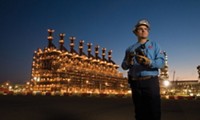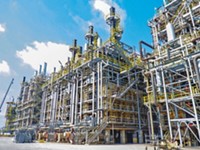Advertisement
Grab your lab coat. Let's get started
Welcome!
Welcome!
Create an account below to get 6 C&EN articles per month, receive newsletters and more - all free.
It seems this is your first time logging in online. Please enter the following information to continue.
As an ACS member you automatically get access to this site. All we need is few more details to create your reading experience.
Not you? Sign in with a different account.
Not you? Sign in with a different account.
ERROR 1
ERROR 1
ERROR 2
ERROR 2
ERROR 2
ERROR 2
ERROR 2
Password and Confirm password must match.
If you have an ACS member number, please enter it here so we can link this account to your membership. (optional)
ERROR 2
ACS values your privacy. By submitting your information, you are gaining access to C&EN and subscribing to our weekly newsletter. We use the information you provide to make your reading experience better, and we will never sell your data to third party members.
Business
Petrochemical Newcomers
Refiner and pipeline companies plan large Gulf Coast chemical investments
by Alexander H. Tullo
May 12, 2008
| A version of this story appeared in
Volume 86, Issue 19

TWO COMPANIES on the petrochemical industry's sidelines are stepping onto the field with big U.S. Gulf Coast projects. The largest U.S. oil refiner, Valero, is considering a massive aromatics complex, and pipeline operator PetroLogistics is planning a propane dehydrogenation project.
Awaiting approval from Valero's board is a new $2.1 billion aromatics complex at its St. Charles, La., refinery. The project includes a reformer, which will convert low-octane naphtha into high-octane reformate. Downstream from the reformer, the company will construct units to extract benzene, toluene, and p-xylene.
The company says the project is meant to address EPA's Mobile Source Air Toxics rule, which requires the reduction of benzene levels in gasoline from about 1% to 0.62% by 2011. The project is a large step into petrochemicals for Valero, which makes modest amounts of aromatics and propylene as refining by-products.
Meanwhile, PetroLogistics expects to build a plant in Houston that will make 1.2 billion lb of propylene per year from propane dehydrogenation technology. The plant will go up on the site of an ethylene cracker that the company purchased in March from ExxonMobil Chemical. The 900 million-lb-per-year cracker had been idle since 2005. The company is not disclosing the cost of the new plant or the purchase price for the site from ExxonMobil.
Resource-rich areas like the Middle East are hosting most of the dehydrogenation plants being slated. The high cost of propane in other regions and the high capital costs of building a dehydrogenation plant have stymied interest in the technology elsewhere.
But Nathan Ticatch, president of PL Propylene, the unit of PetroLogistics managing the project, says using the former ExxonMobil facility will reduce the capital costs of the project and make it economical. "We're doing it with a lot of existing assets, which offer a significant discount to a greenfield plant," he says.
PetroLogistics, backed by the New York City-based private equity firm Lindsay Goldberg & Bessemer, specializes in ethylene and propylene pipelines and storage in Louisiana.




Join the conversation
Contact the reporter
Submit a Letter to the Editor for publication
Engage with us on Twitter